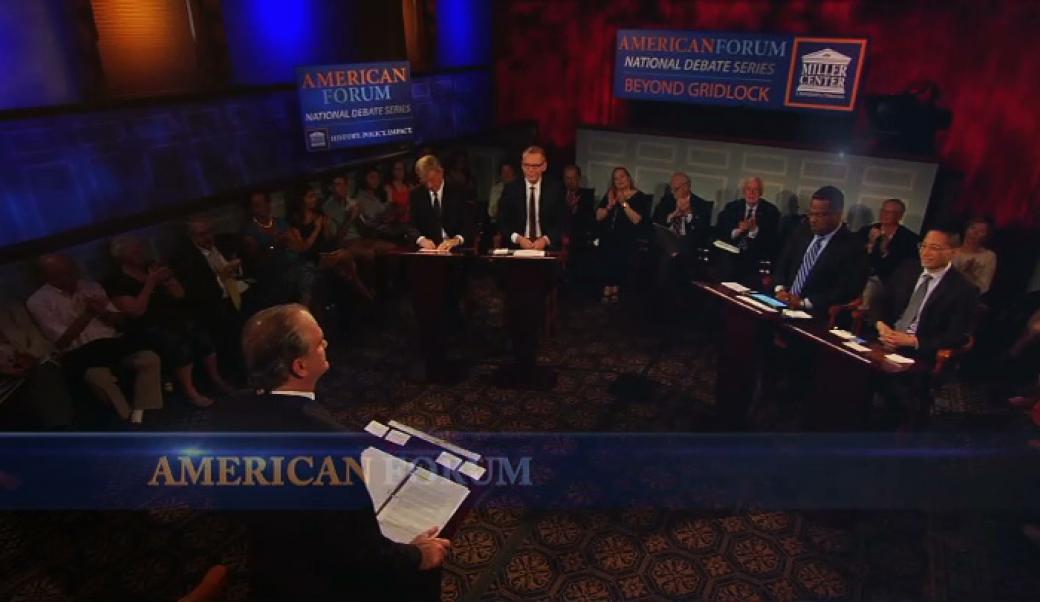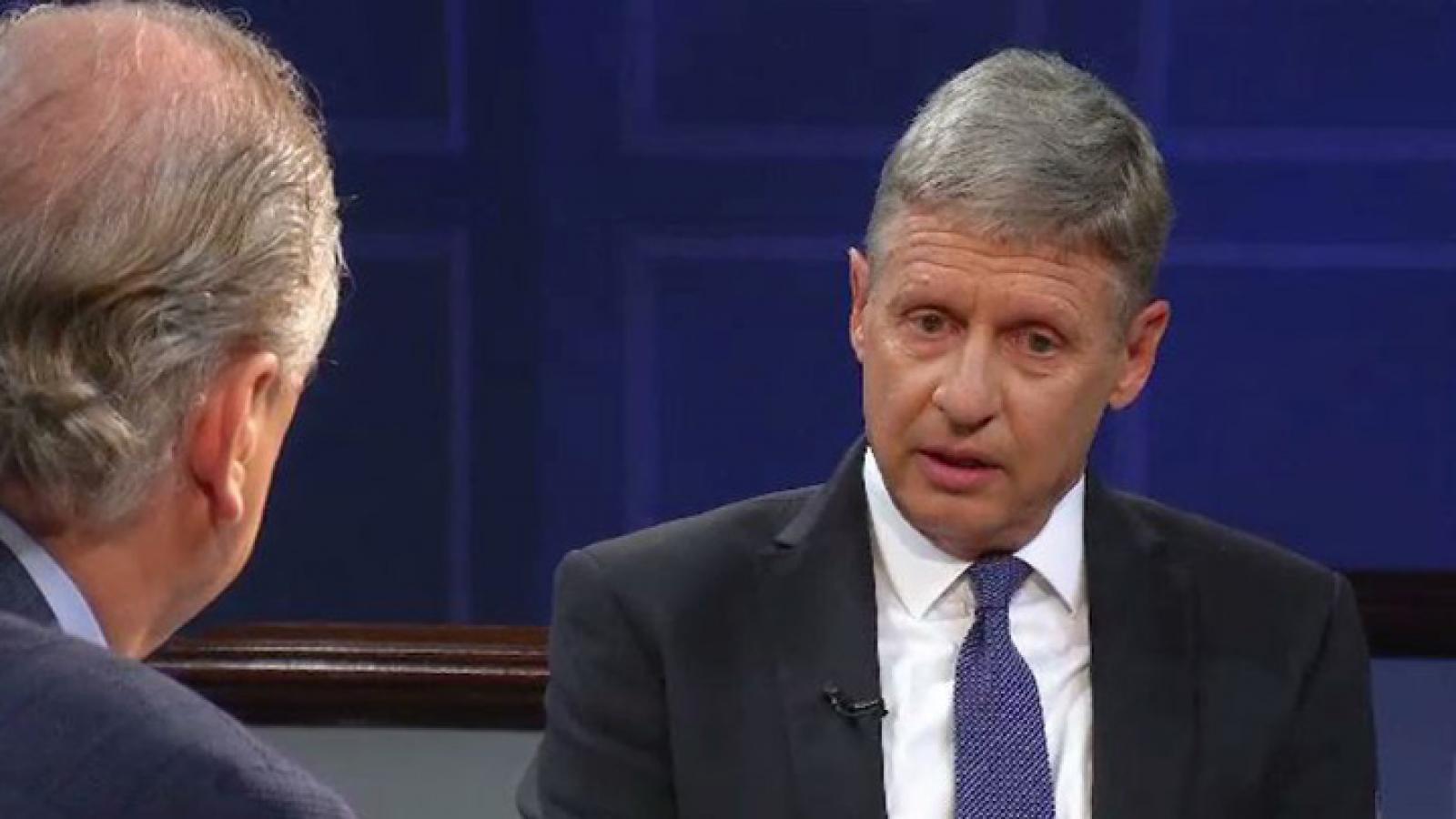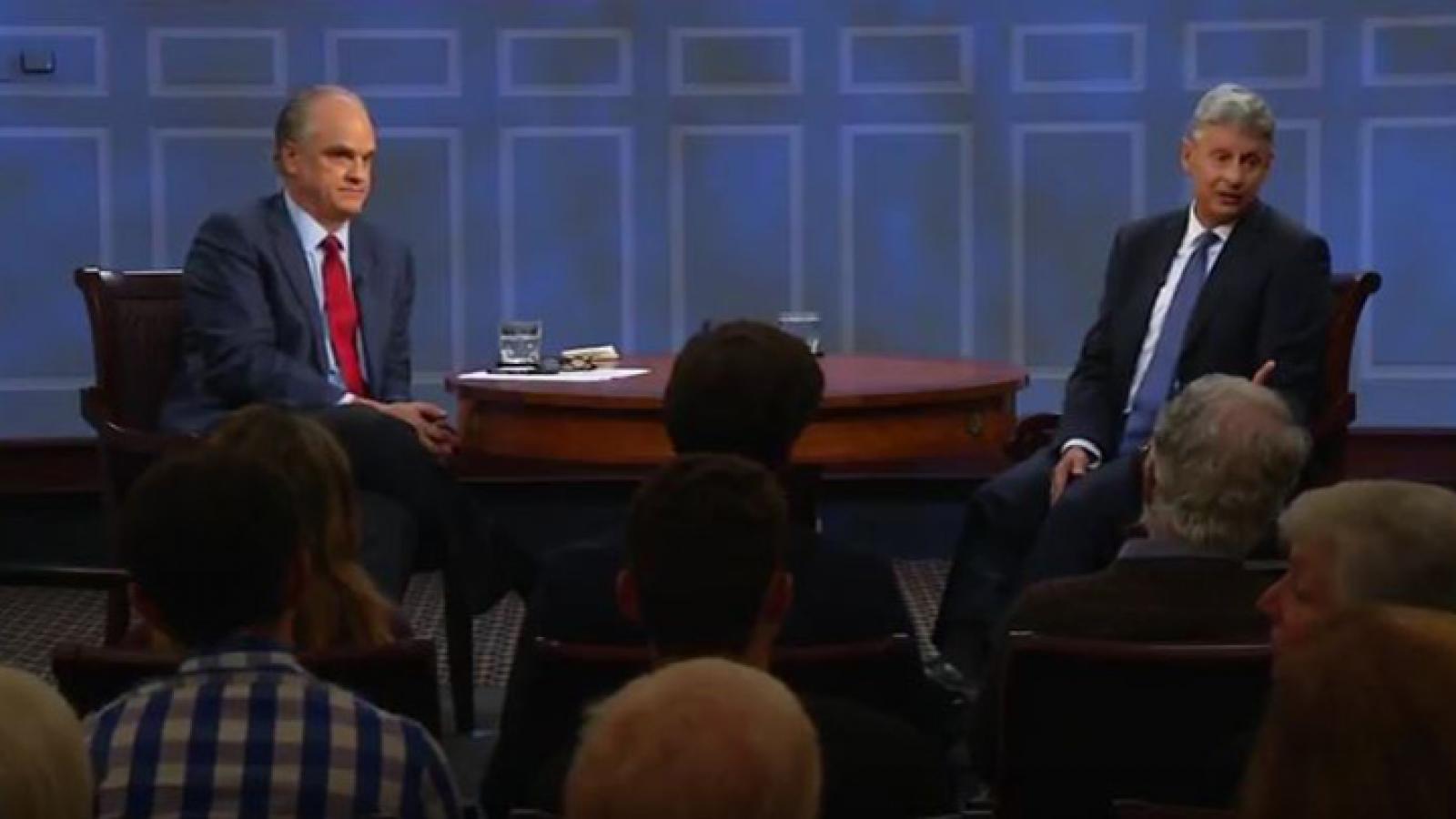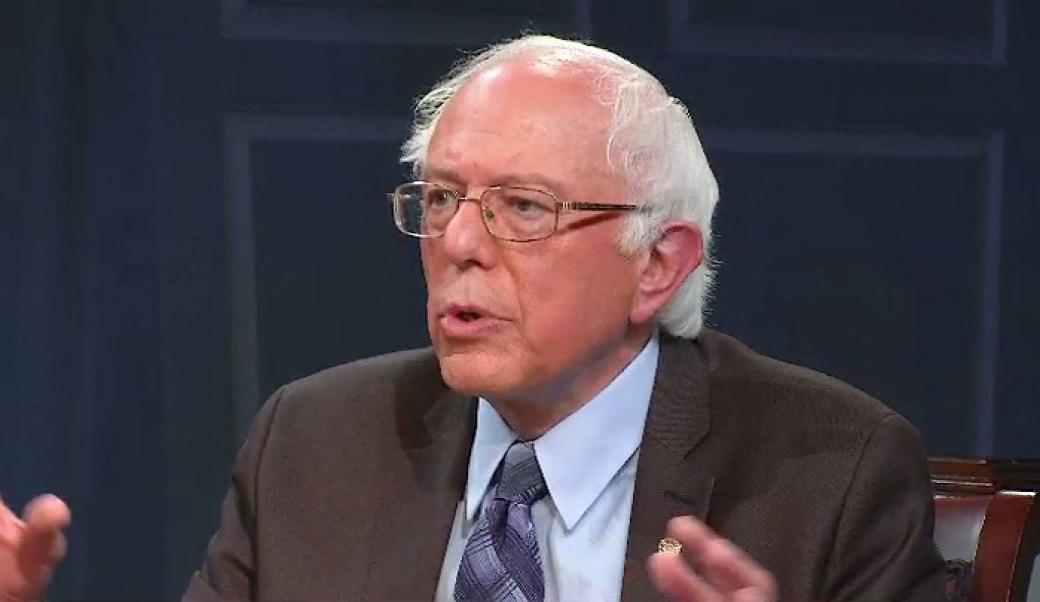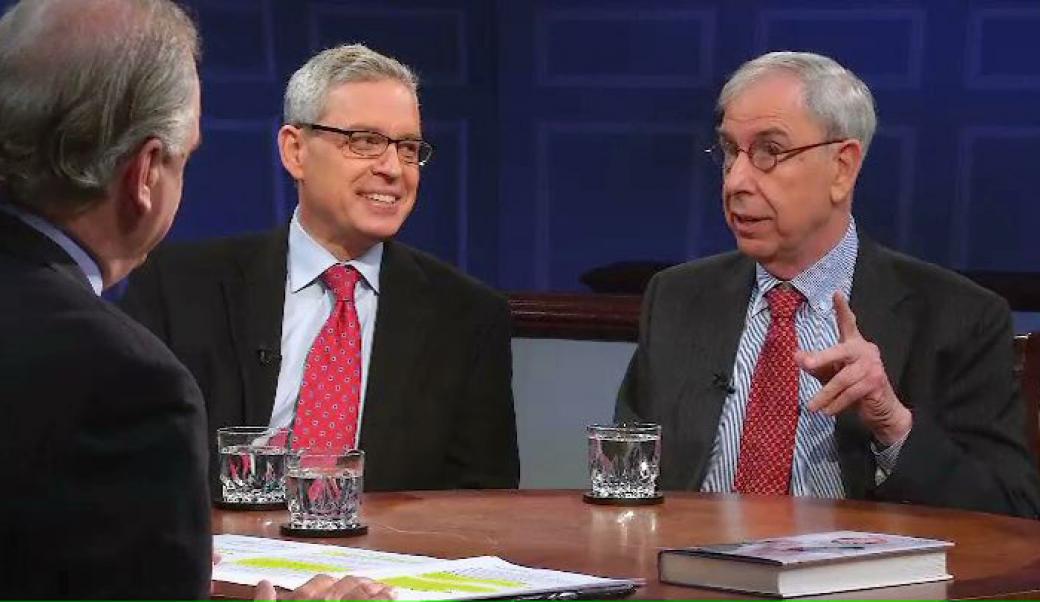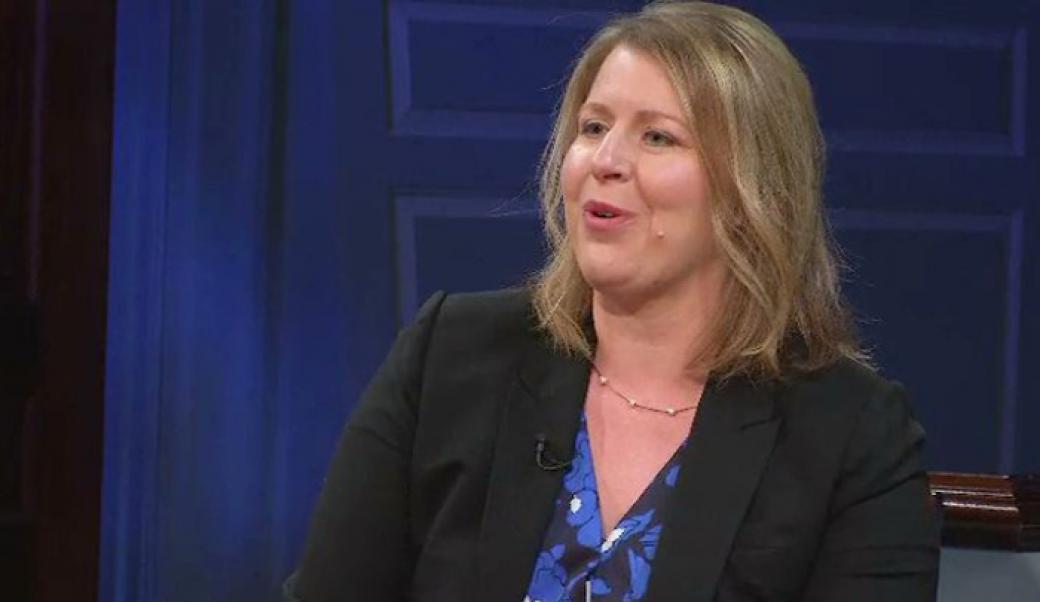About this episode
October 28, 2016
Gary Johnson
Rarely have the nation's two major parties fielded presidential nominees as unpopular as this year’s. Just over half of Americans view Hillary Clinton negatively. More than 60 percent—and rising—don’t like Donald Trump. That hesitation appears to offer a meaningful opening for that rarest of species in the American political ecosystem: a third party alternative. Joining us in this episode is former New Mexico governor Gary Johnson, this year’s presidential nominee for the Libertarian Party, who is hoping to seize that opportunity.
Political Parties and Movements
Is Gary Johnson a viable alternative?
Transcript
Douglas Blackmon: Welcome back to American Forum, I’m Doug Blackmon. Rarely ever have the two primary political parties fielded presidential nominees as unpopular as those nominated by the Republicans and Democrats in 2016. Right at half of Americans say they view former Secretary of State Hillary Clinton negatively. More than 60 percent and rising don’t like Donald Trump. That hesitation and the strong showing in the primaries by Democratic Socialist Senator Bernie Sanders have appeared to offer a meaningful opening for that rarest of species in the American political ecosystem, a third party alternative. Joining us today is former New Mexico governor, Gary Johnson, who as this year’s presidential nominee for the Libertarian Party, is hoping to seize that opportunity. In the final stage of the campaign, polls have shown Governor Johnson and his running mate, former Massachusetts Governor Bill Weld, capturing support from between five and eight percent of voters. Johnson was a successful entrepreneur in the construction business, served as governor of New Mexico from 1995 to 2003, during which time he vetoed more than 750 bills, pushed school reform initiatives and campaigned for the decriminalization of marijuana. He says he also cut taxes 14 times. In 2012, he ran for president, initially as a Republican, but then sought and received the Libertarian Party nomination. Four years later he was nominated by the Libertarians again. Thank you for joining us on American Forum.
FACTOID: The Question: is the Libertarian party a viable alternative?
Gary Johnson: Great to be with you.
2:22 Blackmon: So, we’re late in the stages of the 2016 presidential campaign, you are polling far ahead of where previous Libertarian candidates, at least in recent years have done.
Johnson: You know what? I’m polling higher right now than Ross Perot was polling when he was allowed into the presidential debates. Now, he was polling high, then he dropped out, but then when he came back in- lower than I am right now. So, you know, it’s a shame not having been in the presidential debates.
FACTOID: Ross Perot Ran as an Independent in 1992, with Reform Party in 1996
2:50 Blackmon: Well, also given all that, at this stage, I’m curious, what’s the point for you? What’s the objective for you? Do you really imagine that there’s a possibility of winning the presidency at this stage or is it more about building a party?
Johnson: Well, breaking up the two party system, I’m leading among Independents currently, I’m tied for the lead among millennials 18 to 34, and I’m leading among active military personnel by a wide margin, I’m their choice to be the next commander in chief so giving people their first vote, Doug, I’m pretty proud of that actually. Fifty percent of people right now when they’re going to register to vote are registering as Independents, so where is that representation? And I think you pointed it out, these are the two most polarizing figures ever, I think, nominated by the two major parties. Well Democrats: 28 percent, Republicans: 26. This is what you end up with at some point and it’s arrived today. It’s here.
3:49 Blackmon: What exactly does it mean to be a Libertarian? In as short a summary as you can explain that.
FACTOID: The Libertarian Party was officially formed in the early 1970s
Johnson: Well, so I think 60 percent of Americans are Libertarians. It’s just that they don’t know it. And very broadly speaking, Libertarian: fiscally conservative, socially inclusive, skeptical when it comes to our military interventions.
FACTOID: Libertarian party has raised more than $8 million, well past 2012 totals
When we support regime change in my lifetime, I can’t think of one single example where that has worked out, and then supporting free markets, the opposite of crony capitalism. Crony capitalism is when government picks winners and losers. Free market: more U.S. jobs, not less U.S. jobs. That was pretty quick.
4:30 Blackmon: Let’s run quickly through a series of things. Let’s start with the social/moral issues that are associated with conservatives in some regards and probably not as natural to Libertarians, but so, gay marriage. Where are you on gay marriage?
Johnson: Supports gay marriage and the Libertarian Party has since its inception.
Blackmon: Abortion rights.
Johnson: Supporting a woman’s right to choose.
Blackmon: Drug legalization.
Johnson: Well, the Libertarian Party has espoused legalizing all drugs. Since 1999, I’ve been the highest elected official in the United States to call for the legalization of marijuana. Legalization of marijuana only, but I do believe that we are going to do that and when we do that, I think the country comes to a quantum leap of understanding with regards to other drugs and it will start with looking at drugs first as a health issue rather than a criminal justice issue.
5:26 Blackmon: Elaborate a little further on what you’re…
Johnson: So espousing the legalization of marijuana, we all have friends, family, co-workers that use marijuana.
FACTOID: Johnson was CEO of Cannabis Sativa, a medical marijuana firm
You may disagree with their choice of using marijuana but I’m going to say that they are not criminal in any way whatsoever, unless of course they become impaired, get behind the wheel of the car, get impaired, do harm to others. Never becoming impaired and doing harm to others, will that be legal? We have tens of millions of Americans who are convicted felons that but for drug laws would otherwise be taxpaying, law-abiding citizens. The number one category of arrests in 2016, 2015 in the last year is still marijuana related.
6:18 Blackmon: I want to move through these social issues and then get into things that I think are a little more complicated, but lastly prostitution. You’ve talked about the legalization of prostitution in some circumstances.
Johnson: You know, always supporting states’ rights. So very constitutional when it comes to states’ rights. That’s the issue that the states should decide. If you were to engage in prostitution, where would you do that? Well you would do that, I think, if you were to do it safely or without the uh or without the prospect of getting HIV, Hepatitis C, any sexual transmitted disease you could do that in Nevada where it’s legal.
Blackmon: And then gun rights.
Johnson: Well supporting not only the Second Amendment, but all the Amendments to the Constitution.
7:03 Blackmon: But so what does that mean though? How do we translate that? And now we begin to get, I think, into somewhat more complicated questions, but so with gun rights though, where there is an issue that many people see as there’s a terrible misinterpretation of the Second Amendment that has perhaps facilitated many of these horrible acts that have occurred, now we’ve actually seen terrorist-inspired or individuals inspired by terrorist organizations using our liberal gun regime to obtain weapons and then commit terrible acts with them so it seems a little more complicated than just supporting the Second Amendment.
Johnson: So we should be open to a discussion and debate on how we keep guns out of the hands of the mentally ill. We should be open to that debate and discussion. We should also be open to a debate and discussion on how you keep guns out of the hands of would-be terrorists. As president of the United States I would really be curious to know what transpired between the FBI and the shooter in Orlando for example. Obviously, the system is working up to a certain point and of late, um, the bomber in New York. I mean, the system is working to a certain point. Is it an issue of more resources? If that’s the case, you know, look, as President of the United States I would support more resources being directed at it, but not having had the conversation with the FBI directly as I would be able to as president of the United States, I’m gonna guess they have some real good ideas on how we move forward on this issue.
8:34 Blackmon: I believe you’ve said that you’re against public funding for stem-cell research specifically, but I want to use that to raise the question more generally to the role of government in research. I mean you’re a…
Johnson: Well no, I wouldn’t rule out government funding stem-cell research, but more so as opposed to government funding that, just allowing that to occur.
8:56 Blackmon: So you would say that you wouldn’t object whether there can be stem-cell research might fall into those moral questions, but then the question of what’s the appropriate role of government, not just about stem-cell research, but should the government be a primary financier and organizer of major research efforts in the way that over the last 50 years…
Johnson: You know, you never want to say never on any, on any uh question like that, but is the private sector better or more adept at research? I think it’s a great example to look at right now is outer space, NASA. You know, everything is happening right now in the private sector and NASA is contracting with private sector folks. Just a great example of public, private partnerships that may succeed in making life better for all of us.
9:50 Blackmon: But so, on the whole, the role of research at universities, the role of NASA, the role of government funded R&D through military companies, you’d see the government playing a significantly smaller role in those kinds of efforts?
Johnson: Well by significantly smaller, I think one of the biggest threats facing the country today is the fact that we do have a trillion-dollar debt is that if we don’t balance the federal budget, that burden falls on young people.
FACTOID: U.S. government spent more than $12 trillion on economic bailout
Look, I’m gonna get my health care, I’m gonna get my retirement, I’m gonna send young people to war, President Obama’s Affordable Health Care Act, gee, you as young people, healthy group, you’re gonna pay for those who aren’t so healthy. Spending more money than what you take in, that burden is going to fall on young people and that is unfair. So, when you talk about spending and government and government spending when it comes to research and development. Look, Bill Weld and myself are promising to submit a balanced budget to Congress in the first days and that would be 20 percent reduction in all government spending and we would look to do that as an across the board, but you know what, there’s nothing that’s across the board. Some things work, some things don’t. We never cut out the things that don’t work. Often times we don’t add to resources to what does work.
11:14 Blackmon: Both of the major party candidates would say that they intend to do X or Y or whether they have a plan that they intend an outcome, or that there will be higher economic growths, that there will be more jobs created, clearly they both discussed the role of government as having something to do with making sure there is economic growth and there are more jobs, would you agree with that?
Johnson: Well I’m not gonna get elected king, and I’m not gonna get elected dictator, but if I could wave a magic wand at our tax system, I would eliminate income tax, I would eliminate corporate tax, and I would replace it with one federal consumption tax. I asked people to look at the Fair Tax, which is a proposal that’s been before Congress for about ten years. Every year about eighty congressmen and women sign onto it, but it dots the i’s and crosses the t’s on how you accomplish one federal consumption tax.
FACTOID: The Fair Tax Plan was originally introduced to Congress in 1999
That to me is equality. You do away with all of the loopholes, you do away with- you scrap the tax system as it is now. People that make more money are going to consume more, I think it would be a much more fair system because you would not have a corporate tax and let’s not kid each other, corporate tax is paid for by you and I. We’re the ones that pay for corporate tax, but if there were no corporate tax I believe tens of millions of jobs would get created in this country for no other reason than zero corporate tax and imagine our lives without the IRS. The IRS would not need to exist if we were to do away with income tax and corporate tax.
12:52 Blackmon: Should there be a minimum wage at all?
Johnson: Well, I don’t think so. I don’t think government should play a role in minimum wage, I say this tongue in cheek, but why don’t we take the minimum wage to $75 an hour?
FACTOID: Barack Obama raised minimum pay for federal contractors in 2014
I mean let’s just be the most prosperous country in the world. Well, people scoff at that, well you can’t take it to 75. Oh but somehow you can determine that you should take it to 15 dollars? How is it. it’s minimum wage. It’s described as minimum wage. It’s not a living wage, it’s minimum wage. I think you take away opportunity for young people to actually get a foothold in the workplace by establishing a minimum wage.
Blackmon: And so, were you president and a proposal came forward to do away with the national minimum wage and of states and…
Johnson: Well the reality is I don’t think that that’s going to happen and my background is that I’ve been an entrepreneur my entire life. I actually started a one-man handyman business, me and grew it to over a thousand employees. Minimum wage was not an issue, nobody got paid minimum wage because look, if you showed up on time and wore clean clothes, you had a job for the rest of your life and it wasn’t a minimum wage, it was a higher wage than that.
14:09 Blackmon: You criticize Donald Trump earlier in the process…
Johnson: Not, not, not that much. I’m just kidding
Blackmon: I don’t know why, yeah why would you have done that? No (laughter). But the uh one of the things you criticize Donald Trump about was his uh, his judging others for their place of birth, or the whole birther phenomenon related to President Obama. But I believe you’ve said things suggesting that those were in fact explicitly race, they were explicitly racist position for Mr. Trump to take.
Johnson: Well what’s a racist position is what he’s saying regarding immigration. We should embrace immigration as a country. We’re a country of immigrants. We should make it as easy as possible for somebody who wants to come to this country and be able to work to get a work visa, and a work visa should entail a background check and a social security card that taxes get paid. The main reason why there are 11 million undocumented workers in this country is because the government set up quotas that if you’re standing outside the boarder in Juarez and you can see that jobs exists in Juarez, and you’re looking out for your family and you’re hard working, and these are jobs that Americans don’t want but you can’t get across the border to take those jobs because there’s no moving line, there are no work visas then you cross illegally. So, look, make it as easy as possible to come across with documentation, that’s how you deal with it, do not build a fence across the border, and I’m now speaking as a border governor. The crackdown of 11 million undocumented workers, how’s that going to work in New Mexico where 50 percent of the population is Hispanic. I guess that’s going to be a knock on the door and if you’re Hispanic, which will be every other door, let’s see some papers. And it’s going to be an ugly situation.
FACTOID: U.S. Hispanic population peaked in 2015 at around 57 million people
15:59 Blackmon: And if immigration is relatively straightforward. This kind of work immigration you’re talking about does that also lead to citizenship for large numbers of…
Johnson: That needs to be part of comprehensive immigration reform but yes there should be a pathway to citizenship with regard to the 11 million undocumented workers that are in this country right now. Look, just set up an easy process. Come in the door get a work visa, as long as you’ve been a law abiding citizen or a law abiding visitor you’ll get that, you’ll get that work visa, that’s not jumping the line for citizenship for those that are here undocumented.
16:35 Blackmon: Obviously a Libertarian or even a constitutional originalist who most certainly say that one of the worst things the government can do is incarcerate people who should not be incarcerated or incarcerate them too long. I mean there’s no more obvious kind of abuse of the government’s power than imprison those who shouldn’t be imprisoned, and so a libertarian would clearly have a problem if there were over incarceration. At the same time the president has extremely limited authority over most of these things. If you were to become president and the number of federal prisoners who are currently in prison were still there, we don’t know how many more Obama will commute before the end of his term, but if you released every federal prisoner, there are currently 2.2 million in the country, if you would release all of them we would still have two million in the country.
FACTOID: As of October 2016, Obama had released more than 800 prisoners
So the president still has, that’s just one indicator of what a limited ability the president has to reach into these issues. But would you want to as president want to make the federal government more activist on this particular issues because it would be such a Libertarian principle to want to insure that there not be people incarcerated who shouldn’t be?
Johnson: The main category of prisoner in federal prison today is a person who has sold small amounts of drugs on numerous occasions and been caught. So mandatory sentencing, not allowing judges discretion this is a primary cause for the 2.3 million people that we do have incarcerate. Highest incarceration rate of any country in the world. I refuse to believe that we are any less law abiding than any other country. So victimless non-violent crime uh behind bars, look the president can lead a dialogue on that, and I applaud President Obama for his commutation of sentences for those individuals that do fit in that category.
18:32 Blackmon: You mentioned Obamacare, the Affordable Care Act earlier. Clearly it your review that the way it is set up is not sustainable and it’s not the right way to do it. I assume that critique that it puts too much of a burden on younger people for others or for unhealthy people, would extend to thing like, to the other forms of federally organized health care that already exist like Medicare and Medicaid. And so would you espouse a complete backing away from the Affordable Care Act and then further backing away from some of these other institutional health care programs?
Johnson: Well when you look at Medicare and Medicaid, and by the way, what I um, what I say it’s not an option to say we’re going to do nothing in regards to the entitlements. Medicare, Medicaid, social security, uh military spending, it’s not an option to say let’s do nothing. It’s not an option to say we can expand Medicare and Medicaid when right now we have a 20 trillion dollar debt, I believe that under Hillary Clinton that debt will go up to 50 trillion dollar, and right now I’m speaking to the rule of 72 and growing the federal government at a rate of 9.5 percent a year over eight years. And by the way Hillary Clinton, she’s going to grow, so did George Bush and so did Barack Obama, doubling and doubling. So, it’s not unique to either political party, but when it comes to the reforming Medicaid and Medicare, whether that’s co-pays or raising the age of eligibility when it comes to Medicare, the only way I see reforming both of the areas, and I’m in the camp that believes there should be a healthcare safety net. Having been governor of New Mexico, in my heart of hearts, if the federal government would have block-granted the state of New Mexico 20 percent of less money when it came to Medicaid, I believe I would have overseen the drawing of new lines of eligibility, and in fact established a health care safety net, but done it for less money. I think the only way we reform Medicare is to devolve Medicare to the states, something that currently does not exist, but do the same thing. If I would have gotten blocked granted a fixed amount of money for Medicare, I believe I could’ve drawn those new lines of eligibility and created a healthcare safety net for those over 65. Now I’m back to 50 laboratories of innovation best practice, I think we would have fabulous success if we gave this up to the states. States are going to immolate those states that have a proven track record. It’s not an option to say let’s do nothing when it comes to these entitlements because at some point there will be whiplash inflation to go along with basically the printing of money to cover expenses that we don’t have the money to cover.
21:43 Blackmon: Is this the year that you should have run as a Republican?
Johnson: Uh, no I think that the Republican Party as I think of it, I think Donald Trump alienates more than half of Republicans. As a Republican, as a former Republican governor, Bill Weld would say the same thing. Look, it’s always been about small government, that’s why I’ve been a Republican. Small government, limited government. The Constitution of the United States. The document that limits the power and scope of the federal government. The document that protects the minority from the majority. I think the majority of Republicans are all about small government, and I think the majority of Republicans are socially inclusive. You really don’t care where you’re at socially, just don’t force it on me. Well, I think Donald Trump changes all that. I think this is the demise of the Republican Party. Democrats, I don’t think they could balance a checkbook if it came up and bit them on the rear end. But it doesn’t seem as though either party really has a “huhh” that’s exclusive to either party. I think Hillary Clinton will grow government. I think that deficit will grow much larger under Hillary Clinton and I think she will be as hawkish as any president we could elect. Her being the architect of our current foreign policy, and not necessarily intentional, but this is what has happened.
23:18 Blackmon: Let’s imagine it’s early next year, were past the election, the inauguration has just happened. Let’s consider the possibility that it’s not you. I know it’s a shocking thing to do. But let’s consider that possibility. And let’s say whoever has won the election, Jill Stein or whoever it is, has won the election and there a phone call that comes to you, that asks you to come to the Oval Office, and President Trump or President Clinton says to you, “I know you were opposed to my being elected, very critical of me, nonetheless I’d really like to hear from you, what’s the advice you would give me now as I try to pull the country back together after this incredibly unpleasant campaign season?” What’s the patriotic advice you would give to whoever that person would be?
Johnson: Well first of all the chances of that happening, are about zippo. [Blackmon: Nonetheless] Well nonetheless, I would say let’s balance the federal budget, let’s be socially inclusive. Let’s bring an end to the war on drugs. Let’s stop with our military interventions. Let’s stop supporting regime change, and come on, embrace free markets and if its Donald Trump, don’t build a wall against the border. We’re gonna be on the wrong side of history when it comes to that one. If there’s any country in the world, we should be building a relationship with, a strong relationship with, it should be Mexico.
Blackmon: Governor Gary Johnson, thanks for being here. [Johnson: Yeah Doug, thank you very much.] We also want to thank our viewers who see American Forum every week on more than 250 PBS and world channel stations. It’s been a long, difficult campaign year. We hope our dialogues here have been civil and informative, and perhaps taken a little sting out of the worrisome tone that has engulfed our politics. We’ll keep doing it in the weeks ahead and shift towards identifying solutions for the country and whoever the new president turns out to be. To be a part of our ongoing conversations join us at the Miller Center Facebook page. Visit millercenter.org. Follow us on Twitter. My handle is @douglasblackmon. Govenor Johnson is @governorgaryjohnson. And keep watching us on your local PBS affiliates. I’m Doug Blackmon. See you next week.
